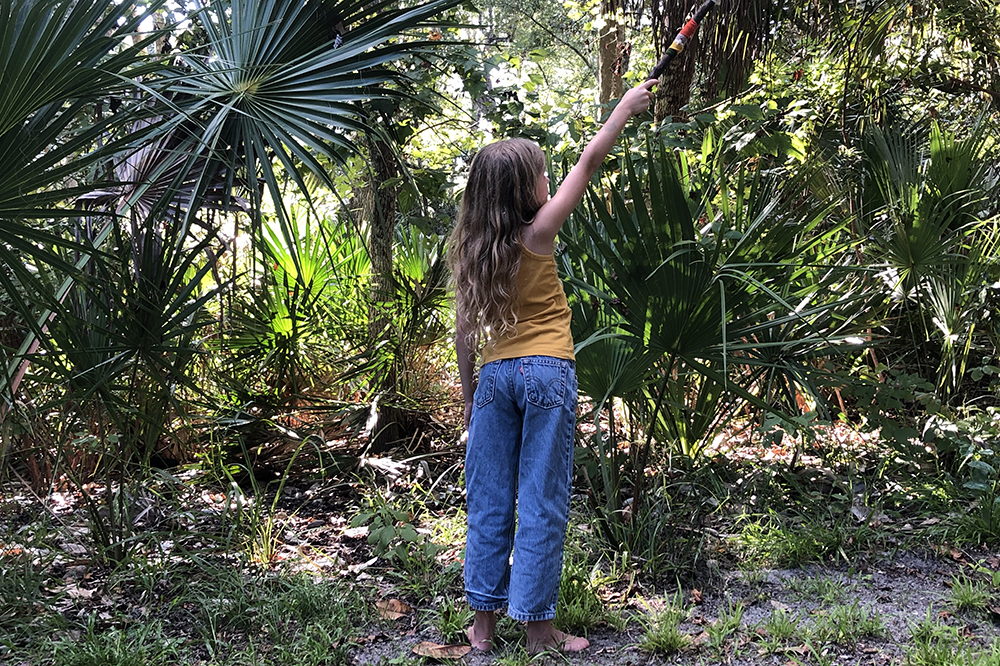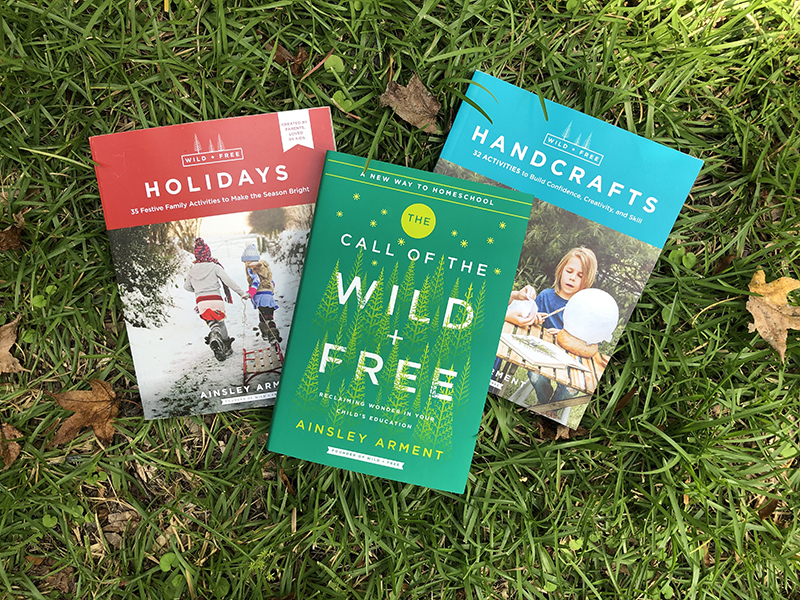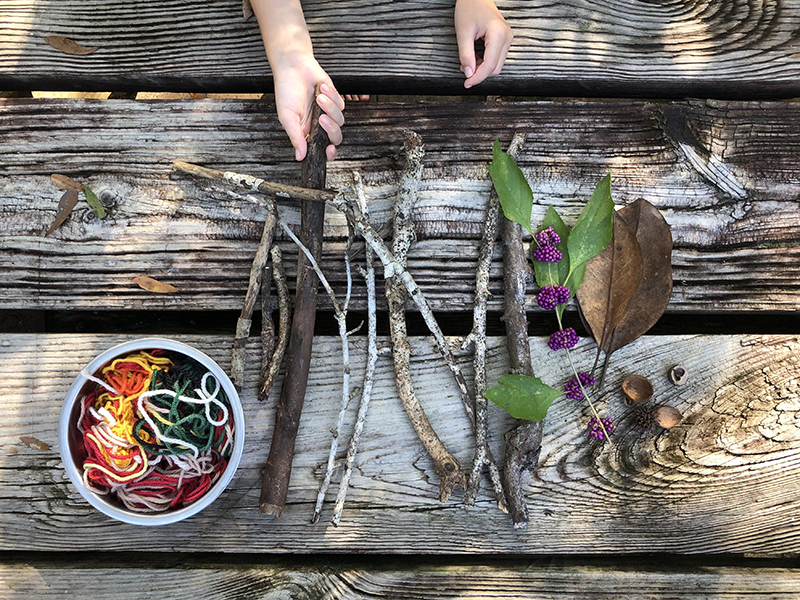
A Modern Homeschooler’s Advice for 7 Distance-Learning Concerns
Written by Katie Hintz-Zambrano
Photography by Photos by Aja Lake
While the 2020/21 school year is definitely not what most families imagined, some parents have spotted more than one silver lining in at-home learning. One such mother is Ainsley Arment, the “home schoolfluencer” and author behind the best-selling Wild & Free book series—The Call of the Wild and Free: Reclaiming Wonder in Your Child’s Education (2019), Wild and Free Handcrafts: 32 Activities to Build Confidence, Creativity, and Skill (2020), and the upcoming titles Wild and Free Holidays: 35 Festive Family Activities to Make the Season Bright (November 24, 2020) and Wild and Free Nature: 25 Outdoor Adventures for Kids to Explore, Discover, and Awaken Their Curiosity (March 30, 2021). The Virginia Beach-based mother of five is also the founder of the beloved homeschooling community of the same name (@wildandfree.co) and has increasingly become a source of inspiration for parents who suddenly find themselves “homeschooling”—or, more accurately, helping their children navigate the often bumpy waters of distance learning.
Below, we’ve asked Arment to weigh in on 7 common concerns of parents during these unexpected times. We’ve also asked like-minded Florida-based mama Aja Lake, founder of Kids in Nature and Body Literacy Project, to take Arment’s books for a spin with her three children to illustrate this article. When it comes to her kids’ own recent at-home education experience, Lake sees lots of positives: “For our family, 2020 has been The Year of Magical Rethinking. We have let things fall off. We have grown closer. We have enjoyed more freedom. We are redefining what learning means for us in this time. We are taking on projects that we may otherwise not have the opportunity to do. We are exploring interests and trying new things. We are allowing technology to support us. We are getting outside a lot. Mostly, we are making memories,” says the consultant and writer who specializes in nature immersion, progressive education, and wellbeing for women and families.
Below, some common distance-learning conundrums families are facing now (raise your hand if you see one—or more—that fits your situation!), and Arment’s wild and free homeschooling tips to remedy them.
Arment’s Advice: “This is a difficult time for everyone in the educational system—yes, teachers and parents—but especially children who are required to sit in front of screens all day. One way to help your child stay engaged is to create a peaceful environment. Provide a comfortable chair with back support, a clean surface to work on, and a diffuser with a favorite essential oil. Add in a periodic back rub, a healthy snack, and plenty of water to stave off the sleepies.”
“Set the stage for Zoom calls by making sure your kids are getting plenty of movement throughout the day. The most important ingredient for growing minds isn’t academics, it’s physical movement. Their brains need their bodies to move! For those without easy access to backyards, start your morning with a walk around the neighborhood. After a long day, help them regroup with some much-needed ‘grounding’ or ‘earthing.’ Take a picnic to a nearby park. If you live near nature, go for a short hike, walk barefoot in the backyard, dig for worms, build mud pies, or simply let them run wild and free for a little while. It’s not going to be perfect, but doing your best to create an atmosphere of calm in the midst of an otherwise chaotic time can make all the difference.”
Arment’s Advice: “The stress and uncertainty of the pandemic are still very real for our children, despite whether it’s a new normal or not. We’re still living through a crisis. Behavioral issues, outbursts, and power struggles are all indicative of big emotions that our children don’t know how to express any other way. For good or for bad, behavior is the way our children express their emotions.”
“Their little worlds must feel so out of control right now. They are exhausted. Sad. Confused. Afraid. Overwhelmed. Rather than trying to confront their behavior, think of ways to address their emotions. Play with them. Engage in conversation. Acknowledge their big emotions and give them your undivided attention. Give them a little gift, just because. Read to them. Make homemade playdough with them. Or string twinkle lights after dark.”
“It’s helpful to cultivate their environment, as well, in case it needs a little reset. Simple things like decluttering their spaces, playing calming music, and providing healthy meals and snacks can do wonders for their overstimulated minds. Above all else, the most important thing we can do is connect and build a loving bond with our children.”

Photo by Aja Lake
Arment’s Advice: “In this current state of virtual learning, it’s more important than ever that we help our kids find balance. This doesn’t mean we should take away their means to learn, play, and socialize through media altogether, but rather think of it as a spectrum and be intentional with screen time, as well as think about ways we can foster wonder in the world within our walls.”
“I’m fully aware that it might feel like the only way to get work done is for your child to be consuming media. Take this opportunity to seek out intentional, active media that imparts positive lessons. There are some fabulous documentaries, such as Planet Earth, that you could let them watch. And plenty of wonderful resources, like Reading Eggs, that reinforce literacy while letting the kids ‘play’ games. And don’t forget about audio books! Listening to a classic like Little House on the Prairie or A Wrinkle in Time or The BFG always helps kids settle in for a while. My kids have learned that even when screen time is off limits, I’ll always say yes to listening to an audio book. They think they’ve slid one by me and I secretly smile on the inside.”
“When trying to detach a child who has been virtual learning all day, activities like themed scavenger hunts, rotating stations or toy bins, and a stocked art cabinet are all fantastic ways to invite kids into creativity without coming across like another assignment. Also STEM kits, such as Tinker Crate or MelScience, subscription boxes that come to your house with everything needed to complete a project, are lifesavers for active hands and minds.”
“And at the risk of sounding like a broken record: get outside, get outside, get outside. A makeshift mud kitchen on the back patio, a basket of sidewalk chalk by the front door, and second-hand bikes at-the-ready are a few ways we’ve overcome the draw of the digital world.”
Arment’s Advice: “We all have seasons when we lean too heavily on screen time. Whether it’s getting through a long bout with the flu, getting through the fourth trimester with a new baby, or navigating a pandemic, it still feels defeating when you know you’re violating your own values. But to make it through this season, we need to bestow heaps of grace on our kids and ourselves. Even outside of a pandemic, our days rarely live up to our ideals. But we keep pressing on, knowing that tiny ripples turn into powerful waves. So, if you’re struggling to find the energy, or if your kids don’t respond immediately, don’t give up. Healthy habits are formed in small, consistent practices over time.”
Arment’s Advice: “Clinginess or separation anxiety is completely natural in kids. As parents, we want our children to be independent, brave, and able to take on the world—no matter their age. So, increasing clinginess in them can make us think we’ve somehow failed to help our kids thrive. Sometimes, we think the best way to help them fly is to push them out of the nest. And depending on our job and flexibility, it might be the only choice we have. But just remember this: YOU are their safe place. YOU are their security. YOU are their basecamp. And they might need a little more time with you in order to feel prepared to climb the mountain ahead, not less. If one or both parents have to leave home for work, try spending a little extra quality time than you think is necessary. Agree on a special date every week or a special phrase you can say to each other each day. Kids crave rhythm and predictability. Create rituals that will become anchors for your days and weeks in order to establish stability in the midst of so much uncertainty.”

Photo by Aja Lake
Arment’s Advice: “In the Wild + Free movement, we talk a lot about ‘deschooling,’ which means getting rid of the conventions that are found in the school system but aren’t necessary or important in home education. Things like sitting at desks. Doing rote memorization. Taking excessive tests and quizzes. Rather than trying to replicate the classroom in the home, as home educators, we get to explore our interests in any environment or timetable we choose. If a parent is struggling with homeschooling, it’s usually because they’re trying to do what a classroom-based teacher does, which is impossible, or measuring results with metrics, which is inconsequential.”
“We can look at the pandemic as a loss to their childhoods or the greatest opportunity to pour into our kids. Take time to discover what lights up your child, deepen your relationship with them, and ditch the idea of what school should look like.”
“The beautiful thing about kids is that they are hard-wired to learn. It’s their default mode in life. There’s no need to worry about them falling behind. A classroom isn’t necessary for learning, and in many ways, it impedes it. If all that children (of all ages) did this year was read a few good books, engage in stimulating conversation, and get outside to play, explore, or think, they would be better for it—not worse. In the absence of buildings and face-to-face learning, make the world your classroom and watch your children flourish in ways they never could otherwise.”
Arment’s Advice: “Many parents have found themselves in a crisis of having to work full-time and educate full-time. Make no mistake, these are two jobs and it’s not how it’s supposed to be. Extend grace to yourself. It might feel easier to just put your head down and try and muddle through, but we’re not meant to do this alone. Find a supportive community of parents going through this same journey. Maybe nothing is as you expected and you haven’t found your flow with whatever education setup you currently have. That’s okay. Don’t hold yourself to artificial standards.”
“When we set our children free to learn anytime, anywhere, we suddenly find ourselves without a measuring stick, and that can feel scary. What counts? What doesn’t? And if it doesn’t count, then how did it ever? These are such good questions, but don’t stop there. When we allow curiosity to become the curriculum, wonder begins to replace all the worry, until it fades away into a distant memory. When we take learning out into the world, not only do our children come alive, but we do too. Stop focusing on homeschooling, and just get to living.”
For more on Ainsley Arment, be sure to follow her on Instagram at @ainsl3y and @wildandfree.co and scoop up her books here. You can also see a tutorial of one of Arment’s Wild & Free handcrafts for kids, below!
Write a Comment
Share this story





I love your suggestions of things to do with the kids! Of course as the author of a children’s vegetable cookbook I would have to add healthy cooking to the list. Don’t we all love to meet in the kitchen for fun, nibbles, and stories? I would love to send you a copy of my cookb ook if it would be of interest to you and your readers. I made this a family adventure cookbook with lots of fun facts, tips and places to color and add cooking observations. Keep up the good work!